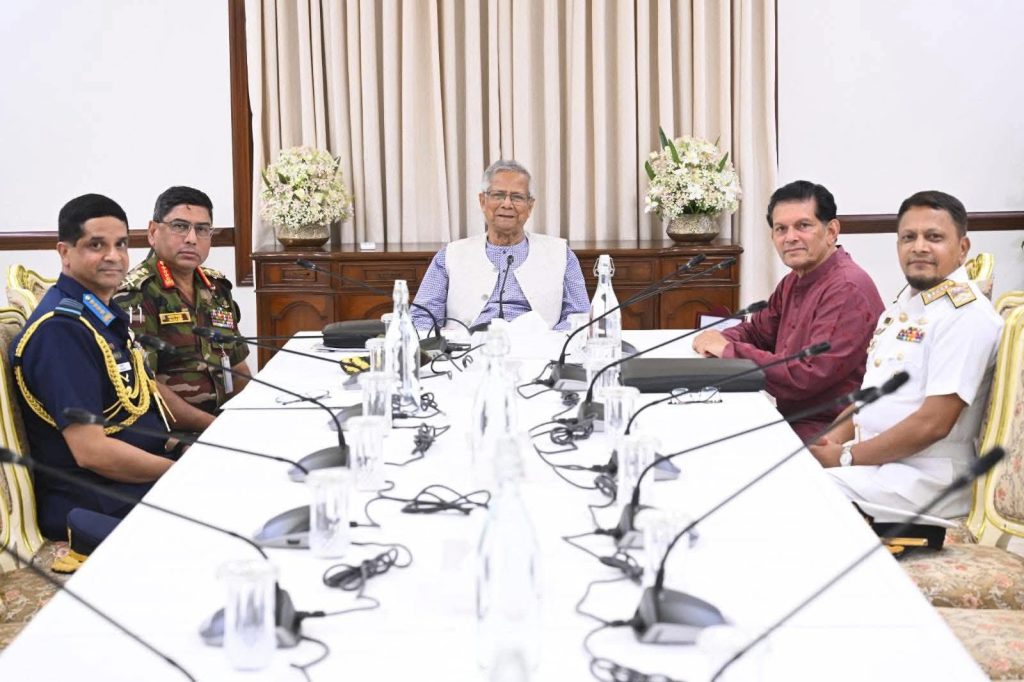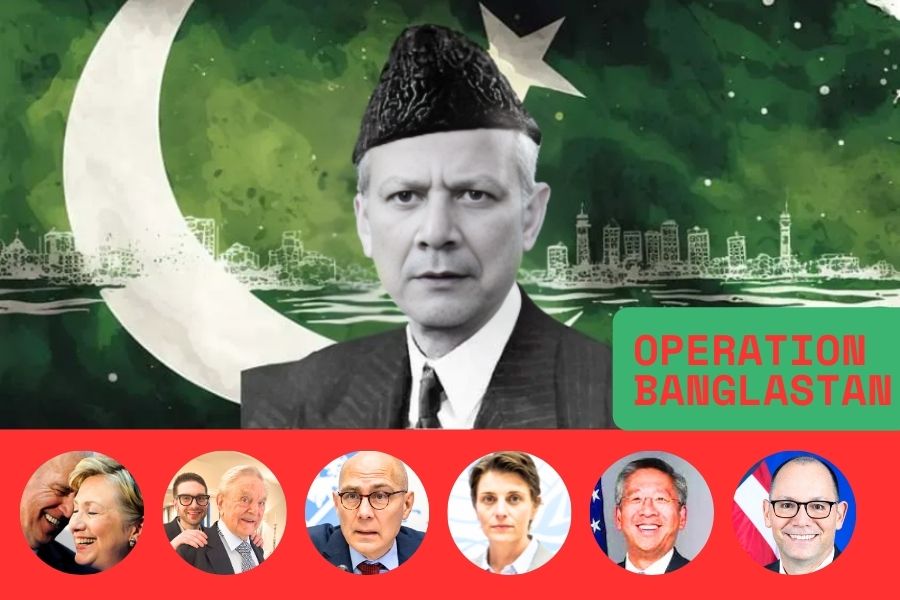As Bangladesh hurtles toward—or stalls at—the brink of its long-delayed February 2026 general elections under Chief Adviser Muhammad Yunus’ beleaguered interim administration, a flurry of high-profile visits by Pakistani generals reveals a chilling duality: superficial gestures of domestic calm amid a shadowy realignment that reeks of election sabotage and engineered chaos.
Far from shepherding a smooth transition, Yunus appears to be stoking the embers of civil war, bolstering Jamaat-e-Islami and National Citizen Party (NCP) proxies while courting backing from US hawks and Pakistan’s ISI. This toxic brew, set against India’s mounting ire, risks plunging the nation into fratricidal strife rather than the promised polls.
On the surface, Yunus’ overtures project ironclad control. Yet, peel back the layers, and they expose a regime more intent on perpetuating power than yielding it—leveraging foreign patrons to arm radicals and fracture the fragile post-Hasina order.
Fortifying the Home Guard: A Veil for Electoral Subversion?
Yunus’ high-stakes huddle with the chiefs of Bangladesh’s tri-services at the Jamuna State Guest House on November 2 was billed as a blueprint for “foolproof” election security, with National Security Adviser Khalilur Rahman (alias Roger Rahman) lurking in the shadows.

July Charter’s Poison Pill: How Ali Riaz is ripping Bangladesh apart
BNP slams ‘deception’ as consensus commission ignites firestorm
Army Chief General Waker-Uz-Zaman, Navy Chief Admiral Mohammad Nazmul Hassan, and Air Force Chief Air Chief Marshal Hasan Mahmood Khan dutifully briefed the chief adviser on deployments—over 90,000 troops poised to blanket the nation. But amid roiling debates over the National July Charter’s half-baked reforms, this feels less like preparation and more like preemptive fortification: a military leash to muzzle dissent if Yunus’s poll-dodging ploy unravels.
The brass’s vows of “tireless” vigilance ring hollow when whispers suggest Yunus is in no rush to vacate the throne. Reports of Jamaat-backed officers securing arrest warrants against top serving and ex-military brass—targeting those who might resist the US-Pakistan-Jamaat nexus—hint at a purge to align the forces with Yunus’s chaos agenda.
With parties like BNP howling over the charter’s rigged consensus, this “readiness” could swiftly morph into repression, ensuring no ballot disrupts the interim’s endless interregnum.
Complementing the martial pomp, President Mohammed Shahabuddin’s four-day retreat to his ancestral Pabna village, kicking off November 6, masquerades as a heartwarming nod to normalcy. The once-autonomous head of state—effectively a hostage since the August 2024 putsch—will hobnob at public receptions, boat races, and village powwows, a jarring pivot from the barbed-wire isolation of yore.
In BNP heartland Pabna, it might woo the opposition faithful, but sceptics see it as cynical theatre: a rural photo-op to camouflage the urban crackdowns on Awami League remnants, all while Yunus funnels tacit support to Jamaat-NCP street muscle.
Interview With AFP: Sheikh Hasina blames foreign conspiracy for ouster
Interview With Reuters: Sheikh Hasina champions fair, inclusive elections
Interview With The Independent: Sheikh Hasina stands tall, debunks propaganda
The Supreme Court’s rare full-bench conclave on November 4—convened mere days after Yunus’s war-room summit—layers on judicial window-dressing. Chief Justice Syed Refaat Ahmed’s 3 p.m. summons of Appellate and High Court Division judges, agenda shrouded in secrecy, screams subtext: hashing out electoral tweaks, safeguarding “independence,” or rubber-stamping the regime’s ordinance blitz. The judiciary, scorched by Yunus’ politicised anti-graft sweeps and abuse of power to free criminals, now teeters as the last bulwark.
A bold ruling—perhaps reinstating the caretaker government system—could torpedo Yunus’s stall tactics and force his cabal’s resignation. But with ISI whispers in the corridors, expect milquetoast murmurs that prolong the limbo, paving the way for street-level anarchy.
External Enablers: The US-ISI-Jamaat Axis Fuels the Fire
While Dhaka polishes its Potemkin village, foreign puppeteers pull strings to keep Yunus afloat—and the polls at bay. The US military’s 2025 incursion, sugarcoated as “cooperation,” has frayed Delhi’s nerves to the breaking point.
September’s Pacific Angel 25-3 in Chittagong marshalled 92 American airmen with Bangladeshi and Sri Lankan counterparts for “humanitarian” exercises, tailed by the Tiger Lightning drill in Sylhet. C-130J Super Hercules sorties to Bay of Bengal atolls—perilously close to Myanmar’s Rohingya quagmire and India’s Andaman sentinel—betray Washington’s designs: a toehold in the Hasina void, masked as aid but primed for encirclement.
Bangladesh’s generals grumble privately over Yankee bootprints, yet Yunus waves them through—lured by dollar-dangling investments or as a bulwark against China’s Belt and Road snare. For the interim chief, it’s a Faustian bargain: interoperability without entanglement.
Ishtehar: The reason why the US wants to build a base in Bangladesh
Airport fire jeopardizes Bangladesh’s nuclear power project amid US-Russia rivalry
Smuggled and looted arms, impunity for jihadists deepen security crisis
For the neighbourhood, it’s a casus belli—India dreads a pincer, Myanmar a refugee deluge. And with US nods greasing Yunus’ Jamaat dalliance (framed as “inclusivity”), the stage is set for calibrated unrest: enough to justify postponing votes under “security threats.”

Cue Pakistan, whose brass’s Dhaka pilgrimages dovetail with the raw wounds of their May 2025 India clash—a barrage of missiles that felled scores and harked back to Balakot’s brinkmanship. Joint Chiefs Chairman General Sahir Shamshad Mirza’s October 27 powwow with Yunus pledged ironclad intel swaps and mutual succour, complete with jaunts to the Siliguri Corridor—”Chicken’s Neck” to cartographers, chokepoint to schemers. This came hot on the heels of Jamaat-fueled warrants hobbling anti-Yunus officers, a blatant ISI-orchestrated cull to purge patriots and install pliable brass.
ISI and DGFI envoys swarm Northeast Bengal outposts, fanning anti-India embers in Sheikh Hasina’s ashes. Yunus’ patronisation of anti-India hate campaigns isn’t diplomacy; it was a Molotov cocktail, signalling alignment with Rawalpindi’s revanchism.
This US-Pak tandem, with Jamaat-NCP as Dhaka’s jihadist shock troops, backs Yunus’ masterstroke: perpetual crisis as pretext for no-elections-ever, birthing a civil war that redraws maps and buries democracy.
The Indian Inferno: A Neighbour’s Wrath Ignites
India’s disquiet isn’t parlour talk; it’s primal fury. Sheltering the exiled Hasina since 2024 has curdled the Ganges, with Yunus railing against “domestic and foreign” meddlers—a dog-whistle for Delhi’s election meddling.
Once Sheikh Hasina’s Teesta-thwarted lifeline, ties now fester with barbs: Yunus’s UNGA jabs at an India-less SAARC, and doomsday prophecies of Delhi-sparked contagions. A year after the ouster, the April 2025 Yunus-Modi summit lingers in frosty limbo, unspoken.
Brig Azmi’s Dark Plan: Islamizing army, unleashing suicide squads on India
LeT’s Ibtisam Elahi Zaheer visits Dhaka, border districts, raising terror alert
Yunus’ militia and the rising threat of Pakistan-backed jihadists in Bangladesh
The 2024 uprising’s “second liberation” call—laced with anti-India, anti-Hindu venom—casts Yunus as the arsonist-in-chief, and his Pakistan flirtations amid the Indo-Pak flare-up a blatant proxy prod. India’s Northeast, roiled by Bangladesh’s frontier flux, interprets this as siege-by-stealth: ISI-fueled insurgents, Jamaat pogroms, all under Yunus’ laissez-faire gaze.
These tableaux—Yunus’ troop tango, Shahabuddin’s village vaudeville, the judges’ secretive scrum—hoist a regime feigning mastery, teeing up polls that might anoint or annihilate Yunus’ reign. Beneath, the US umbra and Pakistani clinch, defying India’s glower, unveil a vertigo-inducing vaudeville: Western windfalls and ummah unity to salve solitude, but inviting reprisal from the subcontinent’s colossus.
Should February’s franchise flower sans fireworks, Yunus slinks off as steward; botch it, and his stratagems script a sequel to 2024’s sanguinary saga. For the region, the calculus cuts deeper: a Bangladesh lurching leeward to Washington and westward to Islamabad could defrost Dhaka-Delhi detente—or detonate a subcontinental cold snap.
As the full bench bangs its gavel on Tuesday, the verdict looms: will Bangladesh’s bastions birth a less brittle tomorrow, mandating caretaker revival and ousting Yunus’ clique? Or surrender to the civil war symphony he’s composed with foreign fiddles and radical bows? The overture swells: the curtain threatens to crash.